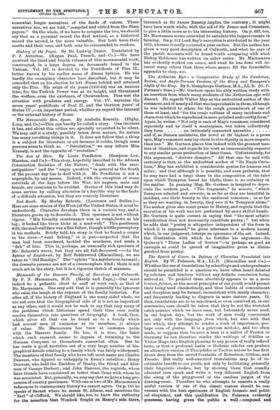The Arthurian Epic : a Comparative Study of the Cambrian,
Breton, and Anglo-Norman Versions of the Story and Tennyson's Idylls of the King. By S. Humphreys Gurteen, MA., LL.B. (G. P. Putnam's Sons.)—Mr. Gurteen opens his ably written study with an assertion from which many students of the Arthurian epic will dissent. He regards Walter Map as the undoubted author of the romances, and of nearly all that was imperishable in them, although he was indebted to others for the rough groundwork of one of them at least, and "for the crude outlines of many incidents and characters which he reproduced in more polished and courtly form." Again, he writes : " Not only is each of Map's romances, considered separately and by itself a masterpiece, but taken collectively they form an intimately connected narrative and if, as Bunsen maintains, the novel at its highest is a prose epic, Map's romances may lay claim to this dignity in more respects than one." Mr. Gurteen places him indeed with the greatest mas- ters of literature, and regards his work as immeasurably superior to any similar prose production of later times. Unfortunately, for this argument, "doctors disagree." All that can be said with certainty is that, as the undoubted author of "De Nugis Curia- lium," Map has exhibited a considerable genius for humour and satire ; and that although it is possible, and even probable, that he may have had a large share in the composition of the tales upon which Tennyson based his Idylls, there is no certainty in the matter. In praising Map, Mr. Gurteen is tempted to depre. ciate the modern poet. "The fragments," he asserts, "which Tennyson selected and rewrote, in so far as they are beautiful in incident, owe their beauty to the mediaeval romancer; in so far as they are wanting in beauty, they owe it to Tennyson alone." The author gives also scant praise to Malory, and regrets that the execution of his work was not performed by more skilful hands. Mr. Gurteen is quite correct in saying that "the most artistic versification does not necessarily constitute poetry ; " but when he adds that "poetry is altogether independent of the form in which it is expressed," he gives utterance to a modern heresy which, in our judgment, betrays an ignorance of the art. Indeed, the illustration with which he fortifies his argument—De Quincey'a "Three Ladies of Sorrow "—is perhaps as good an example as could be quoted of imaginative prose as distin- guished from poetry.


















































 Previous page
Previous page